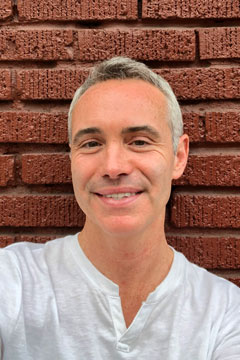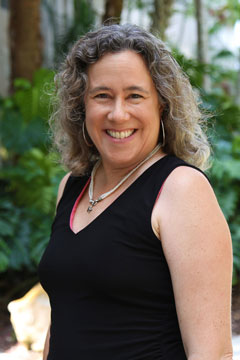Yolanda Martínez-San Miguel, professor and chair of the Department of Modern Languages and Literatures at the University of Miami, along with Andrew Lynch, a sociolinguist and associate professor, emphasized the importance of multilingualism in our global world and the complexities of living in a multilingual environment.

“The invasion of Ukraine reminds us in a brutal and highly undesirable way that there’s very much a concept of national and linguistic boundaries,” said Lynch. “Global literacy [a learning focus of the department] implies the ability to think critically, across all sorts of boundaries—linguistic boundaries, social and cultural boundaries, identity boundaries, and disciplinary boundaries.”
Lynch added that in the era of mass media, texting, FaceTiming, chat, social media, and online communication, global literacy encompasses the awareness of the boundaries between oral and written modes of language, the huge contribution that visual imagery—from film and television—makes in our lives, and an understanding of how meaning is conveyed and then authority or credibility attached to a visual or written text or a sound bite.
“This is literacy writ large, literacy in the sense of reading humanity, reading the world, reading society—and reading is always a question of boundary,” said Lynch, whose expertise focuses on language in postmodernity with an emphasis on Spanish in the United States.
To his point, the Russia invasion of Ukraine is rooted in linguistic and cultural boundaries. Marcia Beck, lecturer in political science in the College of Arts and Sciences, recently noted that Russian President Vladimir Putin receives immense popular support by emphasizing Russia’s connection to Ukraine—historic, linguistic, and familial ties that date to the ninth century and the Slavic tribes that inhabited the region.

The chair highlighted the department’s focus to foster a learning experience that develops global literacy and thriving in a multilingual environment.
“If you come to visit us, you will be experiencing a multiplicity of languages and cultures, that’s what global literacy means for us, not only knowing the language, but also understanding the cultures—and to be comfortable about that,” Martínez-San Miguel said.
She noted that Michele Bowman Underwood’s recent $25 million gift to the University, to be shared with the department and other units, celebrates the department’s focus on multilingualism and cultural studies.
At an event honoring her gift, Bowman Underwood—who speaks English, Portuguese, and Spanish in addition to her native French—recounted how she was forced to move several times while growing up to escape conflict as her family sought economic opportunities.
The multilingual traveler said that she strongly believes that languages hold the keys to avoiding the kind of conflict her family escaped, hence her investment in the department. “Many Americans don’t put enough effort into learning other languages,” Bowman Underwood said. “Speaking English [only] is taken for granted. And you lose a lot—it’s worth making that effort.”
Lynch noted that because English is perceived as the global language and has become ever more pervasive, many in the U.S. and elsewhere are lulled into a sense of English-language security.
“We all have to be reminded that the majority of the planet does not know English, and a substantial segment of humanity doesn’t necessarily have interest in learning English nor the means to do so if they did,” he pointed out. “This reality is perhaps lost on many young people today who expect to be accommodated in English practically anywhere they go and find American popular culture all over the world.”
Lynch added that with the proliferation of tools such as online translators, some may think that learning other languages is no longer as important.
“My grandparents could only imagine what someone speaking Spanish in the Andes would sound like, it was wild fantasy,” he said. “Now you can Google to see and hear a Spanish-speaker from Cuzco, see what they look like, what they’re wearing, the gestures they make, all these things—that is part of literacy and the way that literacy has evolved so radically in the last 50 to 60 years,’’ he added.
“So, in many ways, learning other languages has become all the more important because literacy has become so much more complex. And the only way that you understand literacy is through contemplating other languages and the ways societies communicate,” he noted.
Martínez-San Miguel pointed out that it was “very forward thinking” that the College of Arts and Sciences at the University has maintained a language requirement for students in recognition of Miami's rich multilingual and multicultural community.
“This is huge, because if you don’t have a requirement then students don’t cultivate those languages,” said the Caribbean scholar, adding that department faculty members teach a wide range of topics beyond the core sequenced language courses that explore literary and cultural histories, women, gender, sexuality, identity, and digital humanities, among others. Many courses also focus on immigration, diaspora and displacement, experiences that prompt many people to learn new languages.
The department offers courses in nine of the 12 most spoken languages in Miami-Dade County: Spanish, Portuguese, Haitian Creole, French, Chinese, Hebrew, Italian, German, and Arabic.
Spanish, by far the most spoken language in Miami-Dade County, is the subject of Lynch’s forthcoming book, “Spanish in Miami, Sociolinguistic Dimensions of Postmodernity.” It explores the many varieties or dialects of Spanish that are used in Miami, according to Lynch, and the complexity of the city’s majority bilingual reality.
“There’s a paradox of the great economic, social, and political value of Spanish on one hand, yet the general lack of interest in Spanish on the other hand—in the sense that the language is ideologically subordinate to English and there is extremely little concern about true bilingual education or the development of literacy or formal register skills in Spanish,” Lynch explained.
He noted that Miami-born Spanish-speakers are English-dominant bilinguals who often don’t give importance to studying or cultivating formal skill in Spanish and that bilingualism is largely taken for granted.
“English sort of reigns supreme in the minds of everyone here, while Spanish is going on everywhere, even in institutional settings—that’s a paradox,” Lynch said.
